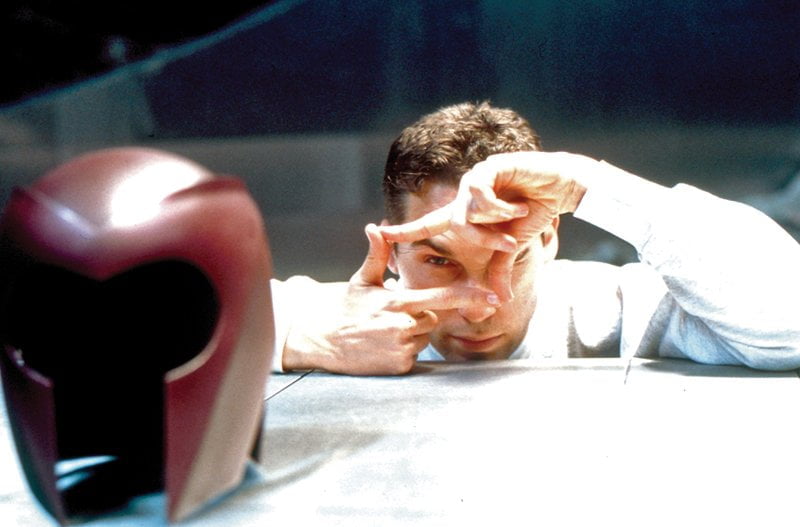The original X-Men Franchise, with Hugh Jackman as its centerpiece, has been book-ended by Bryan Singer (X-Men (2000)) and James Mangold (Logan (2017)). ComiConverse contributor, Joseph Gioeli, examines which of these directors has had the bigger impact on the franchise.
Bryan Singer v James Mangold is a classic case of quantity over quality.
Prior to the X-Men Franchise, Singer’s claim to fame was directing the crime drama, The Usual Suspects (1995). Getting him on board to bring iconic comic book characters to life was a great decision by 20th Century Fox.
In 2000, Singer created the X-Men Universe as we know it today. Using a mix of well know and soon-to-be famous stars like Hugh Jackman, Halle Berry, Rebecca Romijn, Sir Patrick Stewart, and Sir Ian McKellen to kick off the franchise. X-Men was in a league of its own at the time. The first film introduced several heroes and villains while also connecting to the other movies in the series. X-Men also had a relatable narrative about being different and not fitting in with a story focused on Rogue and what she is forced to do because she is a mutant.
Credit: 20th Century Fox
Three years later, Singer topped himself with X2: X-Men United. This film is widely considered the best ensemble X-Men movie; a sequel that took the franchise from a possible one-hit wonder to the successful series it has become.
Credit: 20th Century Fox
Over a decade after the sequel, Singer returned to the franchise to take the reins on X-Men: Days of Future Past (2014). This is possibly the most entertaining and thought-provoking film in the franchise. This film pinned Hugh Jackman’s Wolverine as the protagonist as he travels back to 1973 to convince Xavier (McAvoy) and Magneto (Fassbender) to help him stop Mystique (Lawrence) from killing the creator of the Sentinels, Dr. Bolivar Trask, an act which will eventually wipe out every mutant in the world.
Singer’s less-than-impressive conclusion to his directing stint came in 2016 with X-Men: Apocalypse. If this film did nothing else, it at least introduced a younger cast of actors that will now take over as well as highlighting Jean Grey’s use of her powers as Phoenix, which leads directly into the next X-Men film using this cast, X-Men: Dark Phoenix (2018).
Singer’s four X-Men directorial outings lead to an average Rotten Tomatoes score of 76.5%. His highest being X-Men: Days of Future Past with a 91%.
Credit: 20th Century Fox
In 2013, Walk the Line (2005) and 3:10 to Yuma (2007) director, James Mangold took on his first ever comic book film with The Wolverine. This film got mixed reviews from fans and critics. Some fans liked the adaptation from Chris Claremont and Frank Miller’s 1982 story arc The Wolverine #1. Some fans did not appreciate the lack of other X-Men characters in the film as well as a new and unfamiliar location in Tokyo. Regardless, it showed what a weaker Wolverine would look like; almost like a teaser to Mangold’s only other directorial job on an X-Men film.
Credit: 20th Century Fox
In his second comic book adaptation, Mangold used source material from Mark Millar and Steve McNiven’s 2008 story arc Old Man Logan to create the plot this film. Logan is now widely considered the best movie in the X-Men franchise, partly due to the “R” rating it received just a year after Deadpool. Logan’s rating was for far different types of violence and was part of the film’s effort to tell a new kind of Wolverine story.
Mangold’s two X-Men directorial outings lead to an average Rotten Tomatoes score of 81%. His highest being Logan with a 93%.
Credit: 20th Century Fox
Back to my original “quality v quantity” argument. Bryan Singer directed twice the amount of X-Men movies that James Mangold did, but came out with a lower average critical score, the lowest rating out of all six of the films and not the highest ranked film out of all six. Conversely, Singer did give life to this entire universe and made mostly stellar films. Singer also put his own spin on the style of the films more so than Mangold did. Singer changed the X-Men suits from the classic blue and yellow spandex to the black leather they wore in the first few films. Many people did not have an issue with this, but it was one of the few complaints about the first of his films.
Mangold, on the other hand, only had two X-Men films released, but has a better critical score average than Singer as well as the highest ranked X-Men movie in Logan. Mangold heavily used the comic books as inspiration for the plot lines in both of his films. The closest we may have ever come to seeing Wolverine’s classic yellow suit came in a deleted scene at the end of The Wolverine.
Considering the above, I would have to narrowly give the edge to James Mangold in this argument, but regardless which director you prefer, one thing that can be universally agreed upon is that most of the greatest X-Men films came from the minds and directorial vision of either Singer or Mangold, and that’s all any fan wants, great films.
Do you agree? Who do you think was the better director? Let us know in the comments below!





